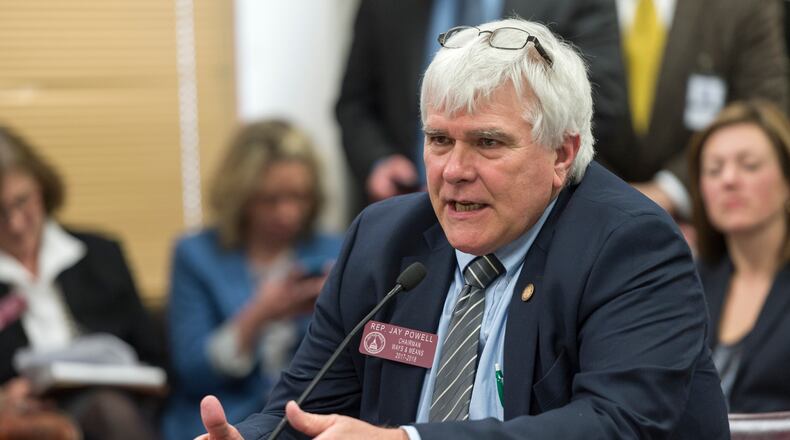It’s now up to the Georgia Senate to decide whether voters in November will be able to limit lawmakers’ raids on fee money meant for things such as cleaning up tire dumps and landfills.
The Georgia House voted 166-1 Wednesday for a proposed constitutional amendment that would allow the General Assembly to mandate that fees go toward their intended purposes. That sets up a Senate vote during the second half of the 2018 session.
Under current law, the only way to ensure fee and fine money goes where it's supposed to go is for voters to dedicate the revenue in constitutional amendments.
"It doesn't matter what we do in a statute as far as directing fees," said House Ways and Means Chairman Jay Powell, R-Camilla, the sponsor of House Resolution 158. "It doesn't mean anything. What we do is we tell people we are going to use these fees for this purpose, then it doesn't happen."
So, when the Legislature approved tire and landfill fees more than two decades ago, it said the money would go to tire dump, landfill and hazardous waste cleanups. Instead, a lot of the money went into the state general fund and was spent elsewhere.
Year after year proposals such as Powell’s stall as governors and budget writers worry that they won’t have the flexibility to divert tens of millions of dollars in fee revenue when they think the state needs to spend the money elsewhere.
The leading outside-the-Legislature force behind the truth-in-fee legislation is the Association County Commissioners of Georgia, which says about $200 million or so has been diverted from landfill and tire fees. Meanwhile, counties don't always have the money they need to do what the fees were intended to do, clean up dumps.
"It concerns me … when we say we're going to charge you this and it does not get to where it was intended," said House Rules Chairman John Meadows, R-Calhoun.
State auditors added fuel to Powell's push in late 2015 when they questioned whether the state should continue charging the $1 fee drivers pay when they get rid of tires and buy new ones. The analysis said while the so-called "scrap tire fee" has been unchanged, the number of cleanups and other activities funded by the Solid Waste Trust Fund has dropped over the past 10 years.
Another high-profile example of the diversions has been “Joshua’s law,” which passed in 2005 and added a surcharge to traffic fines to establish driver education programs in Georgia schools. Some years the law raised $10 million or more. But a 2011 state audit found that of $57 million collected at that point, only $8 million had been used for driver training.
In 2013, lawmakers cut the surcharge from 5 percent to 1.5 percent of the original fine for traffic offenses, and shortly afterward, Gov. Nathan Deal began allocating more money for driver education programs. Still, Alan Brown, whose son's death inspired Joshua's law, said it will take decades to fund driver education programs in every high school at the rate the state has allocated the money.
Powell said the problem has been around for decades, but it grew worse during the Great Recession, when Gov. Sonny Perdue and lawmakers desperately needed every dime they could get to keep state government afloat without raising taxes
Powell’s proposed constitutional amendment would let lawmakers dedicate revenue from fees to specific funds and causes for up to 10 years, when they would come up for renewal.
If the state faced a financial emergency, lawmakers could suspend the dedication of the fee revenue and the money could go into the government’s general fund to be spent where it’s needed.
Never miss a minute of what's happening in Georgia Politics. Subscribe to PoliticallyGeorgia.com.
About the Author
Keep Reading
The Latest
Featured




